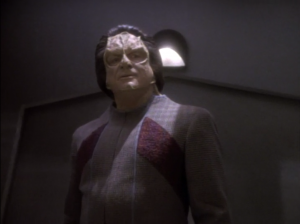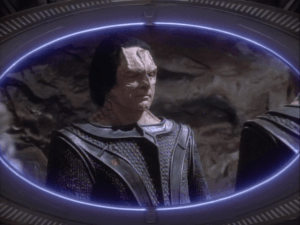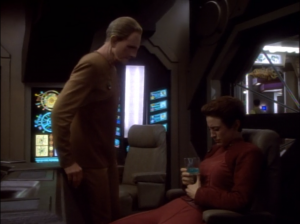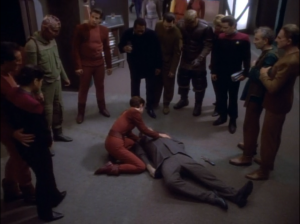
Friday, the final frontier…
Yes, we’re back and the puns are only getting worse! Still no Romulans this week, as we head back to ‘Deep Space Nine‘ to take our first look at that show’s first season and what is arguably its first flirtation with greatness in ‘Duet’.
Like ‘The Next Generation’, ‘Deep Space Nine’ also had kind of a rough start. On top of the usual pitfalls of establishing a new series, it also had to navigate what was at the time a new twist on the ‘Star Trek’ formula. While the first season of ‘Deep Space Nine’ is nowhere near the exercise in frustration that its predecessor faced, it’s still clear that the writing staff was learning on the job. There were a few guest appearances by recurring ‘TNG’ characters, most notably the Duras sisters and Q, though those episodes typically leave something to be desired. And frankly, it’s not too hard to guess which episodes started life as ‘Next Generation’ scripts before being repurposed for the new series. Despite these stumbling blocks, the show began to find its footing toward the end of the season, and though it wouldn’t really hit its stride until year three (as is typical of ‘Trek’ shows of the period), the first season nonetheless includes a few genuine gems, one of which is ‘Duet’.
Originally conceived as something more akin to a courtroom piece built around the idea of defending your worst enemy, the concept quickly evolved, incorporated inspiration from sources including the play ‘The Man in the Glass Booth’ by Robert Shaw (yes, that Robert Shaw) as well as the Nuremberg Trials and the post-war hunt for Nazi fugitives. Indeed, though the idea had been alluded to in the past, this is the first episode to explicitly establish the Caradassian Occupation of Bajor as an atrocity akin to the Holocaust and Japanese imperialism during World War II. This would prove particularly fertile ground as the series depicted Bajor’s recovery from the Occupation and ongoing relations with Cardassia throughout its run.
 A freighter docks at the station seeking medical assistance for a passenger suffering from Kalla-Nohra syndrome, a disease that almost exclusively affects the survivors of a mining accident at the Gallitep Labor Camp on Bajor. Kira goes to greet the patient, as during the Occupation her resistance cell was instrumental in liberating Gallitep, the survivors of which have taken on a symbolic importance to the Bajoran people. On arriving in the infirmary, however, she finds that the patient is a Cardassian.
A freighter docks at the station seeking medical assistance for a passenger suffering from Kalla-Nohra syndrome, a disease that almost exclusively affects the survivors of a mining accident at the Gallitep Labor Camp on Bajor. Kira goes to greet the patient, as during the Occupation her resistance cell was instrumental in liberating Gallitep, the survivors of which have taken on a symbolic importance to the Bajoran people. On arriving in the infirmary, however, she finds that the patient is a Cardassian.
Kira calls security and has the Cardassian – who gives his name as Aamin Marritza – arrested, accusing him of being a war criminal. The claim hinges on the fact that he has Kalla-Nohra, which would place him at Gallitep, the site of countless atrocities. Marritza, meanwhile, insists that he suffers from a condition easily confused with Kalla-Nohra, and that he has never even been to Bajor. Bashir, however, confirms the diagnosis, which places Marritza at the camp at the time of the atrocities. Despite the largely circumstantial nature of the evidence, Kira argues that Marritza is a war criminal and should be handed over to the Bajoran government. When Sisko reminds her – firmly – that Marritza hasn’t been convicted of anything, she offers an emotional plea for Sisko to allow her to conduct the investigation into Marritza’s background. He agrees, and she confronts Marritza about his story. He admits to having been posted at Gallitep, though he insists he was a mere file clerk and blithely downplays the atrocities that took place, even suggesting the reports were fabricated by Gil Darhe’el, the camp’s commander. He then accuses her of being more interested in vengeance than truth.
 Sisko contacts Gull Dukat for help in verifying Marritza’s identity. Dukat is less than helpful, demanding Marritza’s release and promising to hold Sisko responsible if anything happens to him. Odo explains to Sisko that information from his Cardassian sources is consistent with Marritza’s story, but when Kira is able to find a photo of him at Gallitep in the Bajoran archives, the Marritza in the picture looks nothing like the one they know. But there is one Cardassian in the picture who does look like Marritza. Exactly like him, in fact: Gul Darhe’el.
Sisko contacts Gull Dukat for help in verifying Marritza’s identity. Dukat is less than helpful, demanding Marritza’s release and promising to hold Sisko responsible if anything happens to him. Odo explains to Sisko that information from his Cardassian sources is consistent with Marritza’s story, but when Kira is able to find a photo of him at Gallitep in the Bajoran archives, the Marritza in the picture looks nothing like the one they know. But there is one Cardassian in the picture who does look like Marritza. Exactly like him, in fact: Gul Darhe’el.
Kira confronts “Marritza” with this information. Not only does he not deny it, he embraces it, bragging about his performance at Gallitep. Declaring himself “the best at what I did” he admits everything, needling Kira all the way.
Rattled by her conversation with Darhe’el, Kira speaks with Odo, at one point mentioning some remarks Darhe’el made about her former Resistance cell. When Odo wonders how Darhe’el knew which cell Kira was with, they realize something is amiss and Kira returns to the holding cell. While Darhe’el remains evasive, Odo continues investigating, asking Bashir to look into Marritza’s medical records and contacting Dukat, who informs him that not only is Gul Darhe’el dead, but Dukat attended the funeral. Back in the cell, “Darhe’el” has turned the interrogation around on Kira, confronting her about her activities with the Resistance.
 Odo manages to turn up evidence that not only backs up Dukat’s claim regarding Darhe’el’s death, but also suggesting that Darhe’el was nowhere near Gallitep at the time of the accident responsible for all known cases of Kalla-Nohra. Additionally, their prisoner – whoever he is – put his affairs in order before leaving home, almost as if he didn’t expect to come back. He also booked passage on a ship he knew would take him to Deep Space Nine. On reviewing his medical records, Bashir finds evidence that the prisoner underwent cosmetic surgery to resemble Darhe’el. When Kira confronts him with this information, she realizes that he actually is Marritza after all. This is when Marritza finally breaks character and breaks down, reliving his own memories of Gallitep. An emotional Marritza explains that he did all of this for Cardassia, believing that his trial would force his people to admit their guilt for what they did to a shot during the Occupation, even if it meant his death. Kira releases Marritza, but as she is walking him out of the security office, he is stabbed by a Bajoran bystander. The reason? He was Cardassian, that’s reason enough. No, Kira replies, it’s not.
Odo manages to turn up evidence that not only backs up Dukat’s claim regarding Darhe’el’s death, but also suggesting that Darhe’el was nowhere near Gallitep at the time of the accident responsible for all known cases of Kalla-Nohra. Additionally, their prisoner – whoever he is – put his affairs in order before leaving home, almost as if he didn’t expect to come back. He also booked passage on a ship he knew would take him to Deep Space Nine. On reviewing his medical records, Bashir finds evidence that the prisoner underwent cosmetic surgery to resemble Darhe’el. When Kira confronts him with this information, she realizes that he actually is Marritza after all. This is when Marritza finally breaks character and breaks down, reliving his own memories of Gallitep. An emotional Marritza explains that he did all of this for Cardassia, believing that his trial would force his people to admit their guilt for what they did to a shot during the Occupation, even if it meant his death. Kira releases Marritza, but as she is walking him out of the security office, he is stabbed by a Bajoran bystander. The reason? He was Cardassian, that’s reason enough. No, Kira replies, it’s not.
If my summary seems a bit more sparse than usual, that’s because it is. ‘Duet’ is an episode that lives and dies on the strength of its dialogue. Fortunately, the teleplay by Peter Allen Fields delivers exactly that. By turns poignant and powerful, I guarantee you’ll find at least one line in here that will give you chills every time you hear it. But of course, there’s more to the equation than just the teleplay. Anyone can write a pithy one-liner, but you need the right actor to deliver it. And as befits and episode with a title like ‘Duet’, its success ultimately rests squarely on the shoulders of two actors: Nana Visitor and guest star Harris Yulin. For Visitor, this may be the most demanding episode of the series to date, but she rises to the occasion and doesn’t miss a beat. Yulin, on the other hand, is unforgettable. Particularly while Marritza is posing as Darhe’el, he delivers the most bone chilling statements with unnerving calm. It’s impossible to overstate the degree to which the interplay between the two elevates the episode, especially since so much of it is restricted to a single set, and a fairly spartan one at that (appropriate, given that it owes some inspiration to a stage play). It’s the sort of unforgiving staging that would only cause any serious missteps to stick out like a sore thumb.
 While the episode shines a distinctly Nazi-tinted light on the “improprieties” (as Dukat describes them) of the Cardassian Occupation, it also doesn’t shy away from the fact that the Bajoran Resistance, which lest we forget, includes one of our heroes, was at the end of the day a terrorist group. Yes, this primarily comes when Marritza is trying to get under Kira’s skin, but it would also prove to be extremely fertile ground, something the series would return to for years to come.
While the episode shines a distinctly Nazi-tinted light on the “improprieties” (as Dukat describes them) of the Cardassian Occupation, it also doesn’t shy away from the fact that the Bajoran Resistance, which lest we forget, includes one of our heroes, was at the end of the day a terrorist group. Yes, this primarily comes when Marritza is trying to get under Kira’s skin, but it would also prove to be extremely fertile ground, something the series would return to for years to come.
If it seems like I’m gushing, well I am. It’s not a perfect episode, but those flaws are small, and none of them threaten to break the episode. Perhaps the biggest problem is that ‘Duet’ does admittedly feel a bit rushed at times, particularly toward the end. I can forgive that, though, since I’m honestly not sure how well this would hold up if it were spread over multiple episodes.
Were you as moved by ‘Duet’ as I was? Let me know in the comments and be sure to check back in two weeks for another ‘Final Frontier Friday’!
